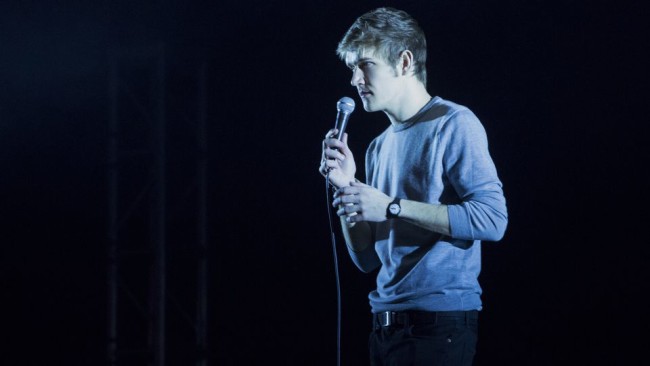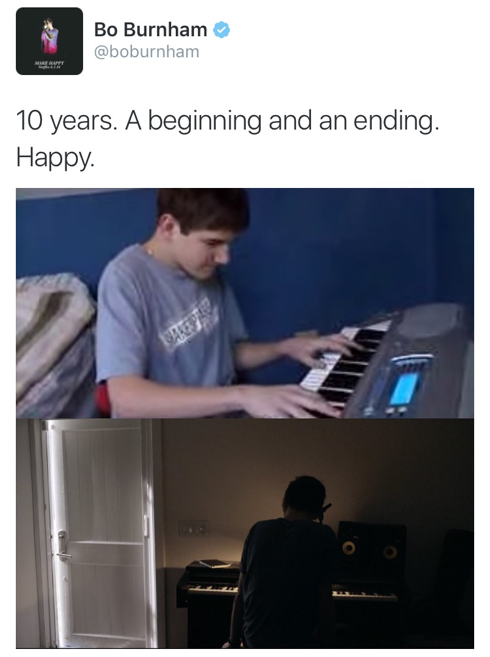
Two Sundays ago, while I was enjoying an otherwise unremarkable afternoon of studying for final exams, Bo Burnham posted this tweet:

And with it, my plans went up in flames. I was prepared to examine Bo Burnham’s latest effort, Make Happy (newly available on Netflix). Now, though, I must write with the knowledge that this special might not just be the latest page in a decade of comedic endeavors, but in fact the final chapter. While I will still inevitably touch on the beautiful ways in which Make Happy dismantles multiple popular genres and cements Burnham’s ability to balance comedy with introspection, this review has to be about more. For a comedian who frequently grapples with the morality of a entertainment career, I want to reassure Bo that the last 10 years of memories we’ve shared have been more than worth it.
In 2006, Bo Burnham stumbled onto comedy. Suddenly, a lanky teenager, uploading his comedy songs to YouTube for his distantly-located brother’s viewing pleasure, found himself racking up millions of hits. Bo went viral — or at least the mid-2000’s version of it.
For the next decade, Bo explored the world of comedy outside of his bedroom-recorded hits. To save you 3,000 words and even more hyperlinks, here are some career highlights:
- The youngest person to be featured on a Comedy Central special
- Co-creator and star of an MTV series that you probably haven’t seen, but definitely should
- One of the first Vine stars, before abandoning the app when it became overrun by preteen girls and infinite Nash Griers
- Made an appearance on Parks and Rec
- At some point in 2011, entered into a rap battle with TJ Miller… but that’s skippable
- Wrote an incredible book of poetry
Over those ten years, and predominantly through his comedy specials, Bo matured from being a 16-year-old making dick jokes in his room, to being the realist comedian whose songs tackled everything from the flaws of popular music to the marginalization of nerds and the Catholic Church. More than anything else though, Bo’s comedy focused on himself.
A self-deprecating comedian from the get-go, Bo’s songs became progressively introspective as he became more famous. In “Art is Dead” (2010), he sings that he “wanted his name in lights, when he could have fed a family of four for forty fucking fortnights.” In “Sad” (2013), he sarcastically reassures himself that “being a comedian isn’t being an insensitive prick capitalizing on the most animalistic impulses of the public! It’s being a hero!” Yet even in light of these not-so-subtle conflicts with his craft, Bo’s struggle is never more coherent than in Make Happy.
When I saw Make Happy performed live in San Francisco on my birthday last year, I had no clue that it was possibly Bo’s final statement. I left the theater still beaming from ear to ear — as much a residual effect of laughing for hours as a sign of respect for the man on the stage and the perfect ending that he had concocted. Bo’s final act, pictured above, is a rant about the problematic diameter of Pringles cans, sloppy Chipotle burritos, and his complex relationship with audiences. For six minutes, Bo toes the omnipresent line between the wacky and the introspective.
He leads with the Bo of old. The Bo that sat in his bedroom and sang about vagina orchards and Keebler elf gang bangs. The Bo that complains about Chipotle.
He closes with the truthful Bo. The beautiful Bo who wants to please us, but also speak his mind. The Bo that loves being on stage, but hates how others do it. The sixteen year old Bo living his dreams and loathing every minute of it.
This is the balanced art — yes, art — of a twenty six year old comedian. In displaying his public struggle to find resolution, he achieves it. Bo Burnham is finally the entertainer we crave and the moral voice he desires to be. We have a view under the hood of the creative machine that has kept us laughing for years. Behind the puns and songs, there is a man who wants out. If Twitter is to be believed, he may have just made a graceful exit.
In what may be the final line of his career, Bo solemnly posits, “Are you happy?” After ten years and so many laughs, I am so, so happy. I hope you are too, Bo.
Photo courtesy of KC Bailey, Netflix.
